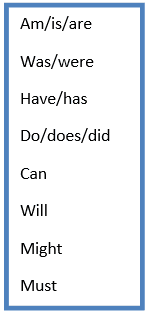Table of Contents
Week 1 | English Grammar
Day 4 |I am doing (present continuous)
Day 5 |Are you doing? (present continuous questions)
Day 6 |I do/work/like (present simple)(present continuous questions)
Week 2 | English Grammar
Day 1 |I don't... (present simple negative)
Day 2 |Do you...? (present simple questions)
Day 3 |I am doing (present continuous) I do (present simple)
Day 4 |I have... and I've got...
Day 6 |Worked/got/went etc (past simple)
Week 3 | English Grammar
Day 1 |I didn't... did you...? (past simple negative and questions)
Day 2 |I was doing (past continuous)
Day 3 |I was doing (past continuous) and I did (past simple)
Day 4 |I have done (present perfect 1)
Day 5 |I've just... I've already... I haven't...yet (present perfect 2)
Day 6 |Have you ever...? (present perfect 3)
Week 4| English Grammar
Day 1 |How long have you...? (present perfect 4)
Day 3 |I have done (present perfect) and I did (past)
Day 4 |Is done, was done (passive 1)
Day 5 |Is being done, has been done (passive 2)
Day 6 |Be/have/do in present and past tenses
Week 5| English Grammar
Day 1 |Regular and irregular verbs
Day 2 |What are you doing tomorrow?
Week 6| English Grammar
Day 2 |Must, mustn't, don't, need to
Day 6 |Do this! Don't do that! Let's do that
Week 7| English Grammar
Day 2 |There is... There are...
Day 3 |There was/were... There has/have been... There will be...
Day 6 |Have you? Are you? Don't you? etc
Week 8| English Grammar
Day 1 |Too/either/so am I/neither do I etc
Day 2 |Isn't/haven't/don't etc (negatives)
Day 3 |Do they? Is it? Have you?
Day 4 |Forming questions (who/what/why/where/when/which)
Day 5 |What...? Which...? How...?
Day 6 |How long does it take...?
Week 9| English Grammar
Day 1 |Do you know where...? I don't know what... etc
Day 2 |He/she said that... He/she told me that...
Day 3 |Work/working Go/going Do/doing
Day 4 |I want you to... I told you to...
Day 5 |I went to the shop to...
Day 6 |Go to... Go on... Go for... Go -ing... Get…
Week 10| English Grammar
Day 4 |I/me He/him They/them etc
Day 6 |Whose is this? It's mine/yours/hers etc
Week 11| English Grammar
Day 1 |Myself/yourself/themselves etc
Week 12| English Grammar
Day 2 |All/most/some/any/no/none etc
Week 13| English Grammar
Day 2 |If we go... if you see... etc
Day 3 |If I had... If we went... etc
Day 4 |A person who... A thing that/which (relative clauses 1)
I Am, I Don’t etc.
In some conversations, speakers conjoin words. For example ‘She isn’t playing but he is.’ In this example ‘he is’ means he is playing. In this example it isn’t compulsory to repeat some words (‘he is playing.’)
You can use the following verbs in the same way:

- I haven’t got a bike but my sister has (=my sister has a bike)
- A: Please can you come with me
B: I’m sorry, I can’t. (= I can’t come with you)
- A: Are you hungry for some chips?
B: I was before but I’m not now (= I was hungry, but I’m not hungry now.)
- A: Do you think Jenny will invite you this evening?
B: She might invite you later. (= she might give an invite)
The forms‘m/’s/’ve etc. cannot be used in this way (short forms) in this way. You must use am/is/have etc. to respond with a grammatically correct sentence, for example:
- She isn’t hungry, but he is. (We cannot use ‘but he’s.’)
However you can use isn’t/ haven’t/ won’t etc. (negative short forms):
- My sister has got a tattoo, but I haven’t.
- ‘Are you and Lisa going out next week?’ ‘I am but Lisa isn’t.’
You can use I Am/ I’m not etc. after Yes and No:
- ‘Are you finishing the homework?’ ‘Yes, I am/ No I’m not
- Will Andy be attending the gala tonight? ‘Yes he will/ No, he won’t.’
- ‘Is there a train to London at 6 pm?’ ‘Yes there is/ No, there isn’t.’
We use do/does for the present simple (See previous topics)
- I don’t like cold weather, but Susan does. (= Sue likes cold weather)
- Leanne bakes a lot, but I don’t. ( = I don’t bake)
- ‘Do you enjoy running?’ ‘Yes, I do.’
We use did for the past simple (See previous topics)
- A: Did you and Christian enjoy the rugby?
B: I did, but Christian didn’t. (= I enjoyed it, but Christian didn’t enjoy it)
- ‘I had an awful day.’ ‘I did’ (= I had an awful day too)
- ‘Did my letter arrive last night?’ ‘No, it didn’t.’


